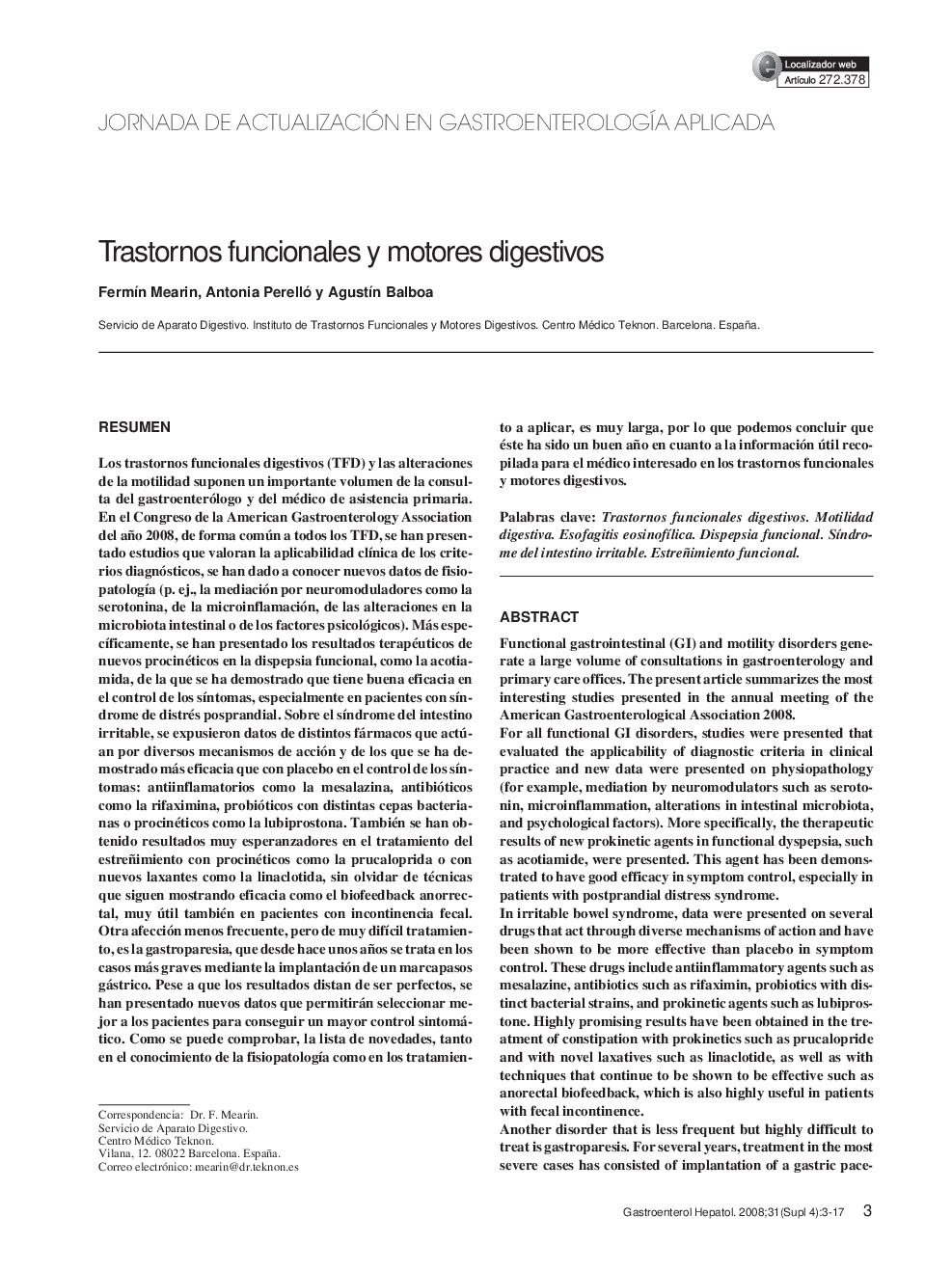| کد مقاله | کد نشریه | سال انتشار | مقاله انگلیسی | نسخه تمام متن |
|---|---|---|---|---|
| 3289233 | 1209559 | 2008 | 15 صفحه PDF | دانلود رایگان |

ResumenLos trastornos funcionales digestivos (TFD) y las alteraciones de la motilidad suponen un importante volumen de la consulta del gastroenterólogo y del médico de asistencia primaria. En el Congreso de la American Gastroenterology Association del año 2008, de forma común a todos los TFD, se han presentado estudios que valoran la aplicabilidad clínica de los criterios diagnósticos, se han dado a conocer nuevos datos de fisiopatología (p. ej., la mediación por neuromoduladores como la serotonina, de la microinflamación, de las alteraciones en la microbiota intestinal o de los factores psicológicos). Más específicamente, se han presentado los resultados terapéuticos de nuevos procinéticos en la dispepsia funcional, como la acotiamida, de la que se ha demostrado que tiene buena eficacia en el control de los síntomas, especialmente en pacientes con síndrome de distrés posprandial. Sobre el síndrome del intestino irritable, se expusieron datos de distintos fármacos que actúan por diversos mecanismos de acción y de los que se ha demostrado más eficacia que con placebo en el control de los síntomas: antiinflamatorios como la mesalazina, antibióticos como la rifaximina, probióticos con distintas cepas bacterianas o procinéticos como la lubiprostona. También se han obtenido resultados muy esperanzadores en el tratamiento del estreñimiento con procinéticos como la prucaloprida o con nuevos laxantes como la linaclotida, sin olvidar de técnicas que siguen mostrando eficacia como el biofeedback anorrectal, muy útil también en pacientes con incontinencia fecal. Otra afección menos frecuente, pero de muy difícil tratamiento, es la gastroparesia, que desde hace unos años se trata en los casos más graves mediante la implantación de un marcapasos gástrico. Pese a que los resultados distan de ser perfectos, se han presentado nuevos datos que permitirán seleccionar mejor a los pacientes para conseguir un mayor control sintomático. Como se puede comprobar, la lista de novedades, tanto en el conocimiento de la fisiopatología como en los tratamiento a aplicar, es muy larga, por lo que podemos concluir que éste ha sido un buen año en cuanto a la información útil recopilada para el médico interesado en los trastornos funcionales y motores digestivos.
Functional gastrointestinal (GI) and motility disorders generate a large volume of consultations in gastroenterology and primary care offices. The present article summarizes the most interesting studies presented in the annual meeting of the American Gastroenterological Association 2008.For all functional GI disorders, studies were presented that evaluated the applicability of diagnostic criteria in clinical practice and new data were presented on physiopathology (for example, mediation by neuromodulators such as serotonin, microinflammation, alterations in intestinal microbiota, and psychological factors). More specifically, the therapeutic results of new prokinetic agents in functional dyspepsia, such as acotiamide, were presented. This agent has been demonstrated to have good efficacy in symptom control, especially in patients with postprandial distress syndrome.In irritable bowel syndrome, data were presented on several drugs that act through diverse mechanisms of action and have been shown to be more effective than placebo in symptom control. These drugs include antiinflammatory agents such as mesalazine, antibiotics such as rifaximin, probiotics with distinct bacterial strains, and prokinetic agents such as lubiprostone. Highly promising results have been obtained in the treatment of constipation with prokinetics such as prucalopride and with novel laxatives such as linaclotide, as well as with techniques that continue to be shown to be effective such as anorectal biofeedback, which is also highly useful in patients with fecal incontinence.Another disorder that is less frequent but highly difficult to treat is gastroparesis. For several years, treatment in the most severe cases has consisted of implantation of a gastric pacemaker. Although the results are far from perfect, new data were presented that allow better patient selection to achieve greater symptom control. The list of new advances, both in knowledge of the physiopathology of these disorders and on their treatments, is extensive. Consequently, 2008 has been a good year in terms of the useful information gathered for physicians interested in functional GI and motor disorders.
Journal: Gastroenterología y Hepatología - Volume 31, Supplement 4, October 2008, Pages 3-17